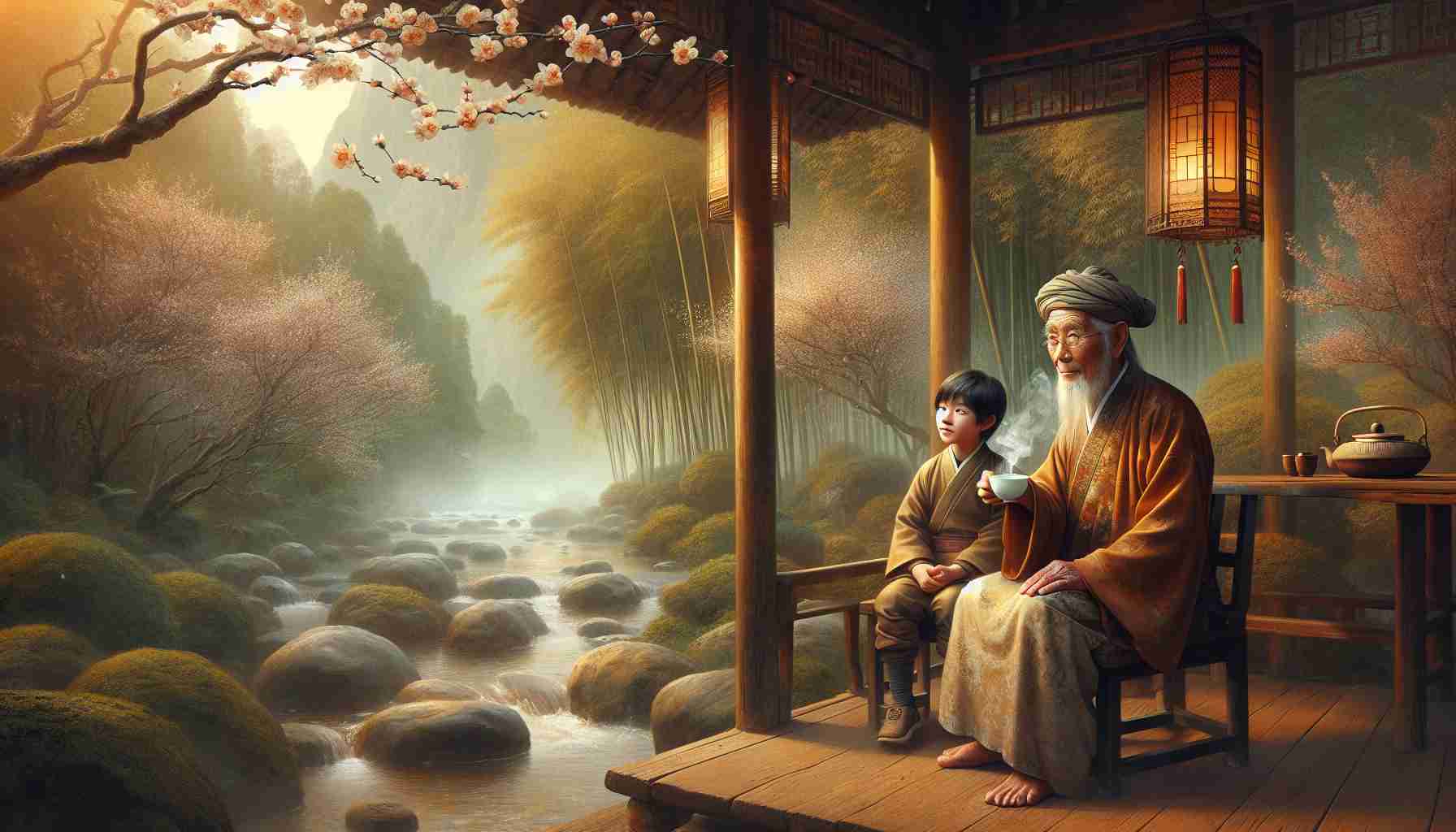

It was a hot summer afternoon, and I was sitting outside the tea shop with my grandfather. The sun was high, but the breeze came in soft, carrying the smell of plum blossoms through the air.
Grandfather sipped his tea and said nothing. That’s how he always was—quiet, calm, like an old mountain watching the sky. I was thirteen and always full of ideas.
“Grandfather," I said, “if I work harder and train faster than anyone else, will I be the best swordsman in the village one day?”
He didn’t answer at first. He took another sip. Then he looked at the hill beyond the trees, where a thin stream trickled down.
“Do you see that stream?” he asked. I nodded.
“It never hurries,” he said. “It never shouts or pushes. But it carves through stone. Not because it tries, but because it flows.”
I scrunched my face. “What does that have to do with sword fighting, Grandfather?”
He chuckled, deep and slow. “Ah, Little Jun,” he said, “you still believe effort always brings success. Come, follow me.”
We walked to the bamboo grove down the road. The old stalks swayed gently in the wind, some bending almost all the way to the ground. I touched one, wondering how it didn’t break.
“Tell me, why do these not snap?” Grandfather asked.
“They bend. They don’t resist,” I said, blinking.
He smiled. “Yes. Because they follow the Tao—the Way. They don’t fight the wind. They move with it. This is Wu Wei. Action through non-action.”
I still didn’t get it. “But if I don’t try, how will I ever get better?”
“You do train,” he said. “But not with force or anger. When your heart is still, your hand strikes true. When you stop chasing, the path becomes clear.”
He let that sit, like tea cooling in a cup.
Weeks passed. I joined the sword lessons again, but something inside me had changed. Before, I rushed every move. I tried to be the fastest, the strongest. But now, I watched like the stream. I bent like the bamboo. I listened more.
One day, the teacher asked me to lead the drill. My steps were light. My cuts flowed. Not sharp or angry—balanced, smooth. When I finished, birds sang nearby, and the air felt full and still.
“You’ve found your Way,” the teacher said. “Without forcing, you’ve become strong.”
That day, I walked home in peace. Not because I was the best—but because I understood.
I didn’t change overnight. But now, whenever I’m too loud inside, I remember the stream and the grove. I breathe. I let go. And I return to the Tao—the Way that is simple, quiet, and strong without trying.
And like Grandfather always said, “The greatest power is in the softest step. The deepest truth is the quietest one.”
It was a hot summer afternoon, and I was sitting outside the tea shop with my grandfather. The sun was high, but the breeze came in soft, carrying the smell of plum blossoms through the air.
Grandfather sipped his tea and said nothing. That’s how he always was—quiet, calm, like an old mountain watching the sky. I was thirteen and always full of ideas.
“Grandfather," I said, “if I work harder and train faster than anyone else, will I be the best swordsman in the village one day?”
He didn’t answer at first. He took another sip. Then he looked at the hill beyond the trees, where a thin stream trickled down.
“Do you see that stream?” he asked. I nodded.
“It never hurries,” he said. “It never shouts or pushes. But it carves through stone. Not because it tries, but because it flows.”
I scrunched my face. “What does that have to do with sword fighting, Grandfather?”
He chuckled, deep and slow. “Ah, Little Jun,” he said, “you still believe effort always brings success. Come, follow me.”
We walked to the bamboo grove down the road. The old stalks swayed gently in the wind, some bending almost all the way to the ground. I touched one, wondering how it didn’t break.
“Tell me, why do these not snap?” Grandfather asked.
“They bend. They don’t resist,” I said, blinking.
He smiled. “Yes. Because they follow the Tao—the Way. They don’t fight the wind. They move with it. This is Wu Wei. Action through non-action.”
I still didn’t get it. “But if I don’t try, how will I ever get better?”
“You do train,” he said. “But not with force or anger. When your heart is still, your hand strikes true. When you stop chasing, the path becomes clear.”
He let that sit, like tea cooling in a cup.
Weeks passed. I joined the sword lessons again, but something inside me had changed. Before, I rushed every move. I tried to be the fastest, the strongest. But now, I watched like the stream. I bent like the bamboo. I listened more.
One day, the teacher asked me to lead the drill. My steps were light. My cuts flowed. Not sharp or angry—balanced, smooth. When I finished, birds sang nearby, and the air felt full and still.
“You’ve found your Way,” the teacher said. “Without forcing, you’ve become strong.”
That day, I walked home in peace. Not because I was the best—but because I understood.
I didn’t change overnight. But now, whenever I’m too loud inside, I remember the stream and the grove. I breathe. I let go. And I return to the Tao—the Way that is simple, quiet, and strong without trying.
And like Grandfather always said, “The greatest power is in the softest step. The deepest truth is the quietest one.”